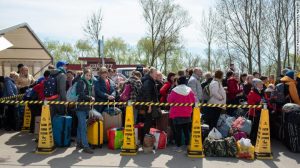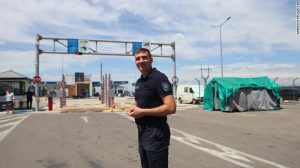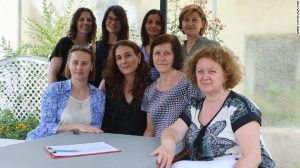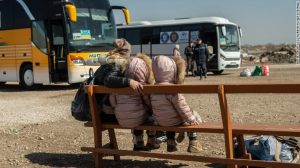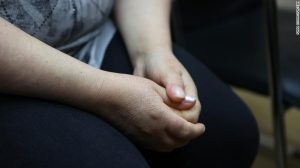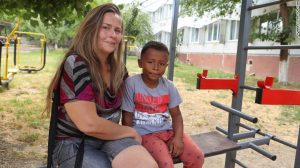‘We are determined to anchor Moldova in the free world:’ Moldova’s Prime Minister on joining the EU
Chisinau, Moldova (CNN)There was nothing obviously untoward about the woman who approached the Palanca border crossing between Ukraine and Moldova with a 15-year-old boy she said was her nephew. But something about the pair just seemed odd. The boy, in particular, appeared embarrassed and uncomfortable.
Suspicious, border officials started asking questions, bringing in social workers and psychologists. “We saw something was not okay, but didn’t know what. So we interviewed them separately,” the psychologist who helped conduct the interview told CNN.
It turned out their story was a lie. The woman was a stranger who had promised the boy a lucrative job in Cyprus — a chance to “be a man” and support his family living in Ukraine.
All he had to do was pretend to be her nephew, give her his passport and help her write a fake parental consent letter, he told the officials.
“We found his mother and called her, and she was crying and said she did not write any declaration and had no idea about this, it was terrible,” the psychologist said. CNN is not using their name for security reasons.
The incident was referred to Moldovan law enforcement for an investigation, the psychologist added. The border authorities did not respond to CNN’s request for more information about the case.
Authorities in the region and international organizations have warned that the number of women and children at risk of human trafficking has skyrocketed because of the war in Ukraine. While the boy at the Palanca crossing was reunited with his family — his mom came to the border to pick him up — many others may not be so fortunate.
CNN has spoken this month to a number of organizations involved in the humanitarian response to the crisis. All had examples of suspicious behavior targeting refugees, especially women — including a man who sought to lure away 10 pregnant women with a bogus offer of housing.
Another woman, Ludmila, who ended up in Moldova after escaping an abusive relationship in Ukraine as the war began, told CNN that her three children had been put at risk in what should have been a sanctuary. They were offered alcohol and worked for strangers, she said, before she managed to find a place in a shelter for vulnerable women in Chisinau, the Moldovan capital.
When Russian President Vladimir Putin ordered his troops to attack Ukraine in late February, volunteers from across Europe rushed to the Ukrainian borders to offer help to those fleeing the violence. But so did people looking to exploit the situation.
Pramila Patten, the United Nations Special Representative on Sexual Violence in Conflict, warned last month that the humanitarian crisis caused by Russia’s war in Ukraine was “rapidly turning into a human trafficking one in which women and children are being exploited.”
More than 5.9 million people have fled Ukraine since the start of the war, according to the UN’s refugee agency. The vast majority are women and children, many of them very vulnerable.
“And the longer the crisis goes on, the more desperate people get,” said Mendy Marsh, co-founder and executive director of VOICE, a non-profit focused on ending violence against women and girls in conflict, crisis, and disaster settings.
“In the beginning of a crisis, you have people who are the most mobile, who have the best connections, maybe a family to get to in Poland or other places in the region. As the crisis goes on longer and longer, there are fewer people who have those connections,” she said, and many are poorer. “Some people have had to move inside of Ukraine and then maybe they’re moving again.”
The International Organization for Migration (IOM) says its anti-trafficking advice hotline in Ukraine has received almost 19,000 calls since the war began — twice the monthly average. “We know that these evil predators are using every trick in the book to dupe confused, vulnerable people with promises of a safe onwards journey,” IOM spokesman Joe Lowry told CNN.
Traffickers’ tactics ‘getting better’
It’s not a new problem — some of the countries Ukrainian refugees are fleeing to, including Moldova, have long-term problems with human trafficking. Moldova has received 570,000 refugees from the war in Ukraine, with about 88,000 still in the country, according to UNICEF, the UN children’s agency.
A 2021 US State Department report into the issue said Moldova still doesn’t meet the minimum policy standards needed for the elimination of trafficking — despite making “significant efforts” to do so in recent years.
The war has amplified the risks. “Trafficking was entrenched in the region before the war and traffickers are not going away because of a conflict or crisis, they’re actually getting better in their tactics,” Marsh said.
Money is a key issue, according to the State Department report. Moldova is one of the poorest countries in Europe and resources are limited.
“Moldova already had a serious issue with social services, protection services” for children, victims of domestic abuse and those suffering gender-based violence, said Ilija Talev, UNICEF’s deputy representative in Moldova. “The crisis added to the issue and it also made the response more expensive.”
One organization that took on new responsibilities as the refugee crisis ballooned in Moldova is Memoria, a Chisinau-based rehabilitation center for victims of torture, violence and other inhuman or degrading treatment. The center offers medical assistance, psychological therapy, counseling, material help and information and advice.
A team of nine women — all of the employees there are women — used to see five to six clients a day before the war. These days, Memoria might need to assist as many as 80 — the majority of them from Ukraine. The group has encountered new issues, while also trying to keep focused on its core clients: Moldovan victims of violence and trafficking.
The center’s assistant project manager Andriana Zaslavet said money is tight and the group is struggling to hire more experts. As in other conflicts, foreign donations often target big, international organizations rather than local groups. Yet it is precisely groups like Zaslavet’s that can offer personalized help because of their local expertise. This extends to educating refugees about the risks of trafficking.
“I had a [client] who is divorced with two little children, she is young and beautiful and she got a contact for someone in France who was supposedly providing support for refugees,” Zaslavet said.
“She contacted him on WhatsApp and he began to ask for photos and was sending her compliments and began to be very insistent that she comes to France, offering money and support if she did, and she became very uncomfortable,” Zaslavet said. In the end, the woman did go to France, but to a different place, where she felt safe, she added.
Dubious offers of help
Yana Tovpeko, who is part of VOICE’s Ukraine response team, recalled cases of people coming to refugee shelters offering dubious work opportunities or transport to other countries.
“Many people try to help, some are volunteers, some are just random people offering a ride and that can be a problem,” she said. “A woman with heavy luggage, with children, needs help; if somebody offers transport, it can be a potentially dangerous situation.”
Tovpeko said VOICE had come across a number of examples of suspicious behavior. There was the man who came into one shelter offering housing for 10 pregnant women. When social workers accompanied the women who wanted to stay with him to the accommodation, it turned out to be a scam — there were no supplies and almost no equipment.
“Ukrainian refugees constantly look for job opportunities, for more permanent, more stable housing opportunities and there are many suspicious offers,” Tovpeko said. “Many women are staying in unofficial shelters, private homes and private hotels … we met with women who were forced to wash dishes seven days per week.
“And when we talked to them, it’s been two months, they were staying at this private place, without any weekend, any time off and they were happy about the conditions and didn’t complain, but when you analyze this situation, it seems like it is a forced labor,” she said.
Talev, of UNICEF, said many refugees are at their most vulnerable — and most at risk of being exploited — immediately after crossing the border.
“[They] need to deal with that initial shock of what is happening in this moment: ‘I am a refugee.’ I think the first time that really hits them is when they cross the border, and they separate from whoever left them on the other side, it’s usually a husband or father or brother,” he said, adding that this initial shock is why UNICEF and other aid organizations tend to concentrate their forces near the border.
Officials at the border crossing in Palanca are well aware of the risk. Anton Zagoreț, the deputy head of the East Directorate of the Moldovan border police, said his team had come across numerous cases of minors traveling on their own or with people who were not their parents.
While most cases are not nefarious — kids might be traveling to safety with relatives or family friends — officials are required to refer each case to specially trained social workers, because of the risk of trafficking.
On the day of the invasion, Zagoreț remembers hearing loud bangs from explosions across the border. And then the crowds came — thousands of people, many with no documents, he said. The line of cars waiting to cross the border was as long as 20 kilometers (12 miles), according to the border police.
“We have protocols to follow when … a minor is traveling with a stranger — we bring in social workers and our partners. We have many minors coming through — every day, even now, maybe four or five kids, mostly [teenagers] traveling on their own,” he said.
New beginnings
When help is not available, the consequences can be dire. Other times, that help comes just in time.
Ludmila, a 35-year-old mother-of-three from Izmail in southwestern Ukraine, was in an abusive relationship for more than a decade. Ludmila is not her real name — she is so scared of her husband and his family, she asked CNN to use a pseudonym.
She said her husband, an alcoholic, beat her and their children. Everybody in their village knew, as did her family, she said. But nobody helped. Sometimes people asked why she didn’t leave — but that was impossible, she said, with no money, three children and a controlling husband.
The war gave her an opportunity finally to escape. Since Ukrainian law currently prevents men aged 18 to 60 from leaving the country, her husband was forced to stay behind. Ludmila and her two sons, age 17 and 15, and her 9-year-old daughter walked all day to get to the border with Moldova.
They ended up in a small village living with relatives of her husband. It wasn’t the safe haven she imagined. The kids worked for strangers in the village to make money and were regularly offered alcohol, she said.
She got sick and, after months of suffering physically and mentally, turned to local authorities for help and was offered a place with her children in a shelter for vulnerable women in Chisinau. Now, she and her children have access to therapy and other resources and are slowly rebuilding their lives. “Strangers here treat me better and offer me more respect than my husband,” she told CNN, nervously clutching her fists and struggling to maintain eye contact.
Ludmila’s neighbor in the shelter, Natasha, who asked for her last name not to be published for safety reasons, had spent the past nine years in Burundi.She was trafficked there by a man she trusted who offered a lucrative business opportunity. All she had to do was travel to the African country and help him set up a gaming business there, she recounted. He promised to pay $1,500 a month — big money for Natasha, whose mother was ill and needed care.
Things didn’t go the way she imagined. The business plan fell through and the man quickly abandoned her, she said. She was stuck in a foreign country, with no money and no way to go back. She worked in low paid jobs, lived in unsafe accommodation and later gave birth to a boy whose father turned out to be abusive and violent. He threatened to kill her if she left, Natasha said.
Last month, six years after the birth of her son, she finally managed to escape, with the help of a UN-affiliated NGO. She was going home — except she wasn’t. A war is raging in her home country of Ukraine.
Like Ludmila, Natasha and her son found refuge in Moldova. The little boy is full of energy, doing cartwheels mid-sentence and running around with the other kids living in the shelter. He proudly informs everyone he meets that he is Ukrainian — despite never having set foot in the country.
Natasha says he is very excited about the prospect of going “home.” The biggest draw? Something he’s never experienced in Burundi: Snow. “He wants to see the winter and snowflakes and to wear gloves. He keeps asking when will it get cold.”
The boy will have to wait a few months to get his first taste of a European winter, but it may be even longer before it’s safe to go to Ukraine.
Ludmila has a different dream. “I want to start from the beginning and have a new life. I don’t want to go back to my husband. If I can find work here, I would like to stay here,” she said, adding that her children are also getting therapy, slowly working through the trauma they’ve experienced.
“I’d like to find a place where I can cook for them, all the dishes they’d like, borscht of course, they ask about that all the time,” she said tearfully. “I really wish that would happen. I believe in God, I believe in miracles.”

